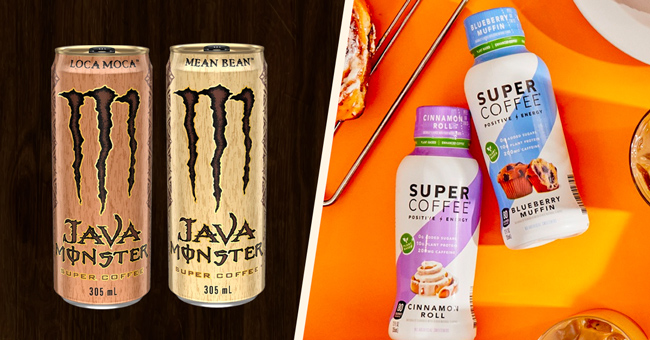Already one of the top selling RTD coffee brands in the U.S., Monster Energy’s Java Monster is set to enter the Australian market with a lower sugar formulation and a new name: “Java Monster Super Coffee.” But if that name rings a bell, you’re not the only one to notice.
“So excited to introduce the newest member of the Monster Australia family,” wrote Rob Bardetta, a Sydney-based senior key account director for Monster, on LinkedIn this week. “Java Monster Super Coffee is coffee done the Monster way! Premium coffee + milk, brewed with killer flavour, supercharged with Monster Super Coffee Herbal blend.”
In now deleted comments on the post, the DeCicco brothers, founders of Texas-based functional coffee company Kitu Life, maker of the Super Coffee brand, called out the use of their name on the cans, calling the name choice “flattering” and suggesting that they welcome competition from the energy drink giant.
In an email to BevNET, Kitu Life co-founder and chief brand officer Jimmy DeCicco said the company had known Monster was interested in using the “Super Coffee” name since it had registered a trademark for the phrase in multiple foreign markets – including Europe and the U.K., Canada, Australia and Asia – two years ago.
When asked, DeCicco said he and his brothers (co-founders Jake and Jordan DeCicco) were not the ones who deleted their LinkedIn comments.
While Kitu Life holds the registered trademark to “Super Coffee” for use on bottled coffees, teas and energy drinks in the U.S., DeCicco said his company did not attempt to challenge Monster’s filings at the time because the brand had not yet expanded internationally and it did not have the resources at the time to invest in securing its own foreign trademarks.
“My brothers and I are flattered that Monster sees Super Coffee as a threat—and is using our name to describe their products abroad,” DeCicco wrote. “We think competition makes us better. As an insurgent brand in a competitive category—which is effectively a duopoly between Starbucks and Java Monster—we have to constantly evolve and innovate to stay relevant, unique and true to our brand promise.”
According to international trademark search engine Trademark Elite, both companies hold claims to the Super Coffee trademark in Canada. Monster’s mark, filed in March 2021, is classified for use on beer and non-alcoholic beverages, while Kitu Life’s mark was filed in December 2021 and is classified for use on “staple foods.”
Market data firm Circana reported that U.S. retail dollar sales of Monster’s RTD iced coffee products grew 3.8% to over $704.9 million in the 52-week period ending February 26, the second largest brand in the category after Starbucks. Meanwhile, sales of Super Coffee’s core bottled iced coffee line were up 12.7% to $53.7 million in the same period, placing it as the sixth largest brand with The Coca-Cola Company, Black Rifle Coffee Company and private label products ahead of it. The data set tracks cold brew and multiserve refrigerated coffees separately.
Despite sharing a name, the liquids inside Super Coffee and Java Monster Super Coffee are quite different. Super Coffee’s RTD line is made with MCT oil and contains 10 grams of protein, zero sugar, 80 calories and 200 mg of caffeine per 12 oz. bottle. The drinks are sweetened with a blend of monk fruit and stevia.
According to its website, the Australian Java Monster Super Coffee is available in Mean Bean (Vanilla) and Loca Moca (Chocolate Mocha) flavors and is packaged in 305 mL cans. Each can contains 140 mg of caffeine, 74 calories, 9.15 grams of sugar, sucrose, maca root powder, ginseng root extract, guarana seed extract, coffee fruit powder and astragalus root extract.
Expansion to foreign markets is a long term goal for Kitu Life’s Super Coffee brand, but DeCicco said the company’s immediate focus remains on the U.S. business where it has steadily scaled its footprint and operations through a master distribution partnership with Anheuser-Busch InBev.
“We’ve built our brand in the grocery channel and now we’re building out convenience and club,” he wrote. “Once we have a solid foundation in the US, international expansion is an exciting white space, especially in countries like Japan and China that over index in RTD coffee consumption.”
While DeCicco seemed to be taking Monster’s claim to “Super Coffee” overseas in stride, he hinted that the two companies will be competing on shelf more directly in the near future: through a new 15 oz. canned Super Coffee line intended to help the brand expand in the convenience channel, with more details to be announced in May.
Monster did not immediately return a request for comment for this story.
